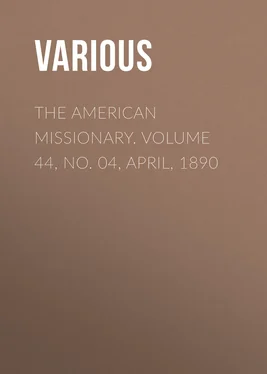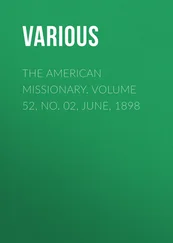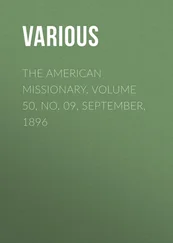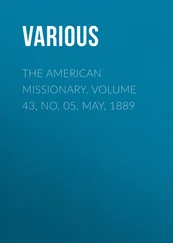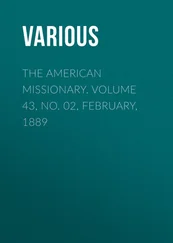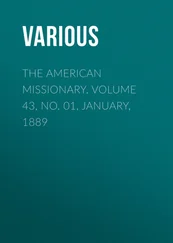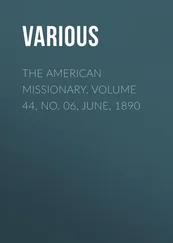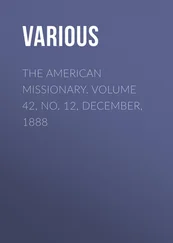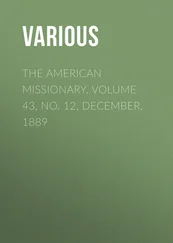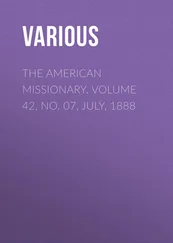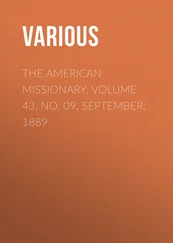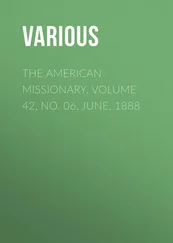Various - The American Missionary. Volume 44, No. 04, April, 1890
Здесь есть возможность читать онлайн «Various - The American Missionary. Volume 44, No. 04, April, 1890» — ознакомительный отрывок электронной книги совершенно бесплатно, а после прочтения отрывка купить полную версию. В некоторых случаях можно слушать аудио, скачать через торрент в формате fb2 и присутствует краткое содержание. Жанр: foreign_antique, periodic, foreign_edu, на английском языке. Описание произведения, (предисловие) а так же отзывы посетителей доступны на портале библиотеки ЛибКат.
- Название:The American Missionary. Volume 44, No. 04, April, 1890
- Автор:
- Жанр:
- Год:неизвестен
- ISBN:нет данных
- Рейтинг книги:5 / 5. Голосов: 1
-
Избранное:Добавить в избранное
- Отзывы:
-
Ваша оценка:
- 100
- 1
- 2
- 3
- 4
- 5
The American Missionary. Volume 44, No. 04, April, 1890: краткое содержание, описание и аннотация
Предлагаем к чтению аннотацию, описание, краткое содержание или предисловие (зависит от того, что написал сам автор книги «The American Missionary. Volume 44, No. 04, April, 1890»). Если вы не нашли необходимую информацию о книге — напишите в комментариях, мы постараемся отыскать её.
The American Missionary. Volume 44, No. 04, April, 1890 — читать онлайн ознакомительный отрывок
Ниже представлен текст книги, разбитый по страницам. Система сохранения места последней прочитанной страницы, позволяет с удобством читать онлайн бесплатно книгу «The American Missionary. Volume 44, No. 04, April, 1890», без необходимости каждый раз заново искать на чём Вы остановились. Поставьте закладку, и сможете в любой момент перейти на страницу, на которой закончили чтение.
Интервал:
Закладка:
Various
The American Missionary – Volume 44, No. 04, April, 1890
American Missionary Association
Removal
The Rooms of the American Missionary Association are now in the Bible House, New York City. Correspondents will please address us accordingly.
Visitors will find our Rooms on the sixth floor of the Bible House, corner Ninth Street and Fourth Avenue; entrance by elevator on Ninth Street.
Rev. Frank P. Woodbury, D.D.
It gives us great pleasure to announce the acceptance by Rev. Frank P. Woodbury, D.D., of the position of Corresponding Secretary of this Association. Since the death of our dear Brother Powell, with the large increase of special resources and the general expansion of our work, an addition to our administrative force has become an absolute necessity. Dr. Woodbury brings to his new position special qualifications. His eighteen years of successful work in his pastorate at Rockford, Ill., and his very effective two years' service in Minneapolis, have made him acquainted with the work of a pastor and the needs of the churches. In these pastorates, and in other services for the general interests of the church, he has shown exceptional administrative gifts. These will find ample range for activity in the Secretaryship. His public address at several of our own Annual Meetings and on many other similar occasions, attest his power as a platform speaker. He will meet with a warm welcome to the duties of this office, and we are confident that he will receive an equally cordial greeting in the churches, Conferences and Associations.
Indian Civilization—Now For A Push Forward
The time has come for new vigor in the Indian service. Gen. Morgan has been confirmed as Indian Commissioner, and his broad and well-matured plans are ready to be put into operation. We hope that Congress will make the necessary appropriations, and that nothing will hinder the multiplication of Indian schools and the ingathering of pupils. With the Sioux Indians, a great crisis has come. Their reservation is severed, and a broad belt is opened in it for the incoming of the white man. There will, of course, be the rush and confusion of new settlers, with the almost inevitable demoralization of the Indians. But a still more serious and protracted evil will grow out of the conflict of the two races and the temptations to the Indians. If ever the friends of the Sioux Indians needed to bestir themselves, it is just now. The helping hand, the open school and the sanctifying Gospel, must forestall all bad influences. So far as the work of the American Missionary Association is concerned, the opening of this reservation to white settlement will necessitate the removal of five or six of its out-stations, occasioning spiritual loss and additional money appropriations.
While we hail with satisfaction the inauguration of Gen. Morgan's broad plans, we feel that there should not be the least relaxation on the part of the churches, in the "contract schools" and in the preaching of the gospel. From John Eliot down, the gospel has been the great civilizing power among the Indians, and it will be a fatal mistake to withhold it. If the new Government policy is successful, the gospel is its essential adjunct, and if there should be hindrances in carrying out that policy, the steady stream of gospel influences will be all the more necessary.
Emigration Of Colored People
We have seen a large map of a Southern railroad, on one side of which were some highly-colored pictures. The first showed the tumble-down cabin of a colored man, himself, wife and boy carrying from it their few belongings to the favored land of promise. The next picture shows him and his family in the woods in his new location, getting ready to build his house. The third picture represents a fine log house, with green fields well fenced, a mule and pigs and chickens in the yard; and the last picture presents a large frame house with a veranda, in which the colored man is seated in a large arm-chair, reading a magazine, and his wife sitting by his side in a rocking chair, while near at hand is the capacious barn, with mules grazing in the adjacent lot.
By the side of each picture is a running comment, supposed to be made by the colored man himself, describing his hard lot 'where he first lived, then telling of his purchase in the new land of promise, stating the price and the terms of purchase; then follows his happy rejoicing over his new location, and finally his triumphant joy in his wealth and fine mansion.
It is by such representations, we are told, that the colored people in various parts of the South are tempted to leave their homes for new locations. The experience of those of their number who have made such migrations has not usually been encouraging, and we fear that thousands more will acquire a good deal of bitter knowledge learned in that same expensive school.
A Comparison
A writer in the March number of The Forum has drawn a vivid picture of France in its poverty, misery and tyranny in 1789, and contrasted with this the thrift, the improved land culture, and the better clothing, food, home and intelligence of the French peasantry of 1889. The Revolution of 1789 broke the tyranny of the old crushing regime and opened the way for the new world that brightens and gladdens the France of to-day. But the Revolution did not itself make the great change; it simply made it possible.
Two factors developed in French character were the practical forces in the new prosperity—economy and the desire for ownership of lands and homes. That economy was pushed, in many cases, almost to the extreme of miserly hoarding. We give below a few brief extracts illustrating the point in question:
"The life led by a comfortable English or American farmer would represent wicked waste and shameful indulgence to a much richer French peasant. I, myself, know a laborer on wages of less than twenty shillings a week, who by thrift has bought ten acres of the magnificent garden land between Fontainebleau and the Seine, worth many thousand pounds, on which grow all kinds of fruits and vegetables, and the famous dessert grapes; yet who, with all his wealth and abundance, denies himself and his two children meat on Sundays, and even a drink of the wine which he grows and makes for the market."
"The French peasant has great virtues, but he has the defects of his virtues, and his home life is far from idyllic. He is laborious, shrewd, enduring, frugal, self-reliant, sober, honest and capable of intense self-control for a distant reward; but that reward is property in land, in pursuit of which he may become as pitiless as a bloodhound."
"Take him for all in all, he is a strong and noteworthy force in modern civilization. Though his country has not the vast mineral wealth of England, nor her gigantic development in manufactures and in commerce, he has made France one of the richest, most solid, most progressive countries on earth. He is quite as frugal and patient as the German, and is far more ingenious and skillful. He has not the energy of the Englishman, or the elastic spring of the American, but he is far more saving and much more provident. He 'wastes nothing, and spends little,' and thus, since his country comes next to England and America in natural resources and national energy, he has built up one of the strongest, most self-contained and most durable of modern peoples."
A very significant parallel is presented in these two pictures to one that may be drawn between the Negro of 1861 and the Negro of 1961. The Civil War corresponded to the Revolution in France. It broke the fetters of the slave, and made his future a possibility. If, now, the Negro will fill out the beautiful picture in imitation of the French peasant, he must imitate him in rigid economy and in the ambition to own his own land and his own home. We do not of course advise the penuriousness of the miser, but the Negro is in little danger on that score. The grandest impulse, even in economy and in obtaining property, is found in a genuine Christian character. This is the work that our ministers and teachers are endeavoring to accomplish, but we are sure It will aid them to urge this practical saving of money, curtailing of needless expense, and the making of most determined efforts to become owners of their own homes.
Читать дальшеИнтервал:
Закладка:
Похожие книги на «The American Missionary. Volume 44, No. 04, April, 1890»
Представляем Вашему вниманию похожие книги на «The American Missionary. Volume 44, No. 04, April, 1890» списком для выбора. Мы отобрали схожую по названию и смыслу литературу в надежде предоставить читателям больше вариантов отыскать новые, интересные, ещё непрочитанные произведения.
Обсуждение, отзывы о книге «The American Missionary. Volume 44, No. 04, April, 1890» и просто собственные мнения читателей. Оставьте ваши комментарии, напишите, что Вы думаете о произведении, его смысле или главных героях. Укажите что конкретно понравилось, а что нет, и почему Вы так считаете.
